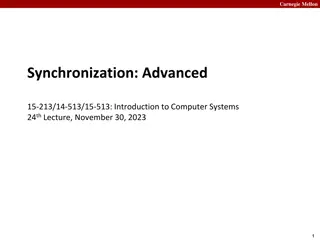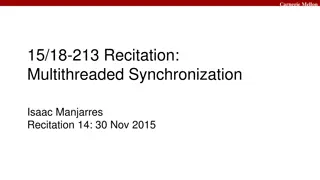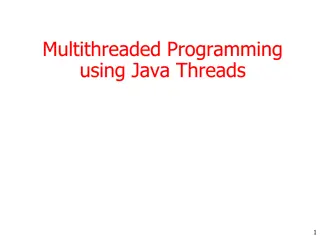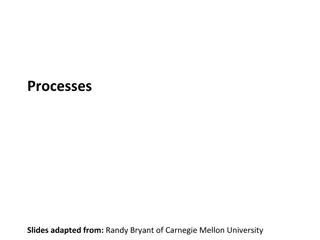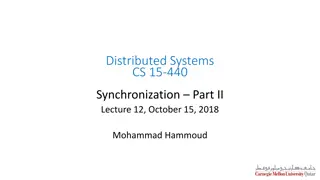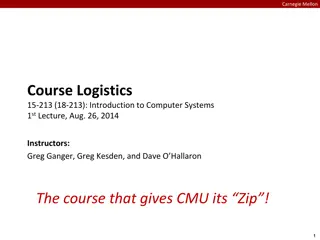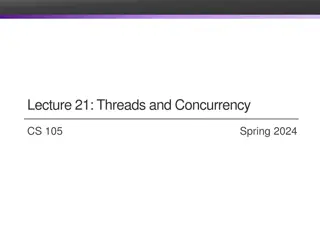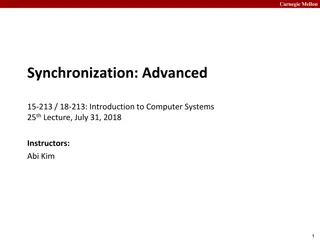Carnegie Mellon ProxyLab Part 2: Threads and Synchronization
In this Carnegie Mellon recitation, the ProxyLab Part 2 focuses on understanding threads and synchronization in computer systems programming. It emphasizes the importance of building robust proxies that handle network connections concurrently and maintain long-lived server processes without resource leaks. The discussion covers multi-threaded cache design, proper thread management, and utilizing tools like Firefox's Network Monitor for verification. Additionally, it explores scenarios for thread detachment and overriding default behaviors for thread termination status.
Download Presentation

Please find below an Image/Link to download the presentation.
The content on the website is provided AS IS for your information and personal use only. It may not be sold, licensed, or shared on other websites without obtaining consent from the author.If you encounter any issues during the download, it is possible that the publisher has removed the file from their server.
You are allowed to download the files provided on this website for personal or commercial use, subject to the condition that they are used lawfully. All files are the property of their respective owners.
The content on the website is provided AS IS for your information and personal use only. It may not be sold, licensed, or shared on other websites without obtaining consent from the author.
E N D
Presentation Transcript
Carnegie Mellon Recitation 14: Proxy Lab Part 2 Instructor: TA(s) 1 Bryant and O Hallaron, Computer Systems: A Programmer s Perspective, Third Edition
Carnegie Mellon Outline Proxylab Threading Threads and Synchronization 2 Bryant and O Hallaron, Computer Systems: A Programmer s Perspective, Third Edition
Carnegie Mellon ProxyLab ProxyLab is due in 1 week. No grace days Make sure to submit well in advance of the deadline in case there are errors in your submission. Build errors are a common source of failure A proxy is a server process It is expected to be long-lived To not leak resources To be robust against user input 3 Bryant and O Hallaron, Computer Systems: A Programmer s Perspective, Third Edition
Carnegie Mellon Proxies and Threads Network connections can be handled concurrently Three approaches were discussed in lecture for doing so Your proxy should (eventually) use threads Threaded echo server is a good example of how to do this Multi-threaded cache design Need to have multiple readers or one writer Be careful how you use mutexes you do not want to serialize your readers Be careful how you maintain your object age Tools Use Firefox s Network Monitor (Developer > Network) to see if all requests have been fulfilled 4 Bryant and O Hallaron, Computer Systems: A Programmer s Perspective, Third Edition
Carnegie Mellon Join / Detach Does the following code terminate? Why or why not? int main(int argc, char** argv) { pthread_create(&tid, NULL, work, NULL); if (pthread_join(tid, NULL) != 0) printf( Done.\n ); void* work(void* a) { pthread_detatch(pthread_self()); while(1); } 5 Bryant and O Hallaron, Computer Systems: A Programmer s Perspective, Third Edition
Carnegie Mellon Join / Detach cont. Does the following code terminate now? Why or why not? int main(int argc, char** argv) { pthread_create(&tid, NULL, work, NULL); sleep(1); if (pthread_join(tid, NULL) != 0) printf( Done.\n ); void* work(void* a) { pthread_detach(pthread_self()); while(1); } 6 Bryant and O Hallaron, Computer Systems: A Programmer s Perspective, Third Edition
Carnegie Mellon When should threads detach? In general, pthreads will wait to be reaped via pthread_join. When should this behavior be overridden? When termination status does not matter. pthread_join provides a return value When result of thread is not needed. When other threads do not depend on this thread having completed 7 Bryant and O Hallaron, Computer Systems: A Programmer s Perspective, Third Edition
Carnegie Mellon Threads What is the range of value(s) that main will print? A programmer proposes removing j from thread and just directly accessing count. Does the answer change? int main(int argc, char** argv) { pthread_t tid[2]; for(int i = 0; i < 2; i++) pthread_create(&tid[i], NULL, thread, NULL); for (int i = 0; i < 2; i++) pthread_join(tid[i]); printf( %d\n , count); return 0; } volatile int count = 0; void* thread(void* v) { int j = count; j = j + 1; count = j; } 8 Bryant and O Hallaron, Computer Systems: A Programmer s Perspective, Third Edition
Carnegie Mellon Synchronization Is not cheap 100s of cycles just to acquire without waiting Is also not that expensive Recall your malloc target of 15000kops => ~100 cycles May be necessary Correctness is always more important than performance 9 Bryant and O Hallaron, Computer Systems: A Programmer s Perspective, Third Edition
Carnegie Mellon Which synchronization should I use? Counting a shared resource, such as shared buffers Semaphore Exclusive access to one or more variables Mutex Most operations are reading, rarely writing / modifying RWLock 10 Bryant and O Hallaron, Computer Systems: A Programmer s Perspective, Third Edition
Carnegie Mellon Threads Revisited Which lock type should be used? Where should it be acquired / released? int main(int argc, char** argv) { pthread_t tid[2]; for(int i = 0; i < 2; i++) pthread_create(&tid[i], NULL, thread, NULL); for (int i = 0; i < 2; i++) pthread_join(tid[i]); printf( %d\n , count); return 0; } volatile int count = 0; void* thread(void* v) { int j = count; j = j + 1; count = j; } 11 Bryant and O Hallaron, Computer Systems: A Programmer s Perspective, Third Edition
Carnegie Mellon Associating locks with data Given the following key-value store Key and value have separate RWLocks: klock and vlock When an entry is replaced, both locks are acquired. Describe why the printf may not be accurate. ... pthread_rwlock_rdlock(klock); match = search(k); pthread_rwlock_unlock(klock); typedef struct _data_t { int key; size_t value; } data_t; if (match != -1) { pthread_rwlock_rdlock(vlock); printf( %zd\n , space[match]); pthread_rwlock_unlock(vlock); } #define SIZE 10 data_t space[SIZE]; int search(int k) { for(int j = 0; j < SIZE; j++) if (space[j].key == k) return j; return -1; } 12 Bryant and O Hallaron, Computer Systems: A Programmer s Perspective, Third Edition
Carnegie Mellon Locks gone wrong RWLocks are particularly susceptible to which issue: b. Livelock 1. a. Starvation c. Deadlock If some code acquires rwlocks as readers: LockA then LockB, while other readers go LockB then LockA. What, if any, order can a writer acquire both LockA and LockB? No order is possible without a potential deadlock. 1. Design an approach to acquiring two semaphores that avoids deadlock and livelock, while allowing progress to other threads needing only one semaphore. 3. 13 Bryant and O Hallaron, Computer Systems: A Programmer s Perspective, Third Edition
Carnegie Mellon Client-to-Client Communication Clients don t have to fetch content from servers Clients can communicate with each other In a chat system, a server acts as a facilitator between clients Clients could also send messages directly to each other, but this is more complicated (peer-to-peer networking) Running the chat server ./chatserver <port> Running the client telnet <hostname> <port> What race conditions could arise from having communication between multiple clients? 14 Bryant and O Hallaron, Computer Systems: A Programmer s Perspective, Third Edition
Carnegie Mellon Proxylab Reminders Plan out your implementation Weeks of programming can save you hours of planning Anonymous Arbitrarily using mutexes will not fix race conditions Read the writeup Submit your code (days) early Test that the submission will build and run on Autolab Final exam is only a few weeks away! 15 Bryant and O Hallaron, Computer Systems: A Programmer s Perspective, Third Edition
Carnegie Mellon Appendix Calling exit() will terminate all threads Calling pthread_join on a detached thread is technically undefined behavior. Was defined as returning an error. 16 Bryant and O Hallaron, Computer Systems: A Programmer s Perspective, Third Edition



